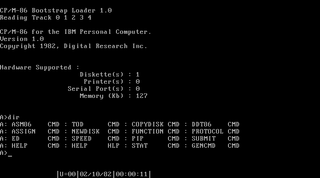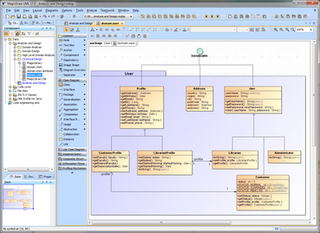An integrated development environment (IDE) is a software application that provides comprehensive facilities for software development. An IDE normally consists of at least a source-code editor, build automation tools, and a debugger. Some IDEs, such as IntelliJ IDEA, Eclipse and Lazarus contain the necessary compiler, interpreter or both; others, such as SharpDevelop and NetBeans, do not.

A debugger or debugging tool is a computer program used to test and debug other programs. The main use of a debugger is to run the target program under controlled conditions that permit the programmer to track its execution and monitor changes in computer resources that may indicate malfunctioning code. Typical debugging facilities include the ability to run or halt the target program at specific points, display the contents of memory, CPU registers or storage devices, and modify memory or register contents in order to enter selected test data that might be a cause of faulty program execution.

A tablet is a pharmaceutical oral dosage form or solid unit dosage form. Tablets may be defined as the solid unit dosage form of medication with suitable excipients. It comprises a mixture of active substances and excipients, usually in powder form, that are pressed or compacted into a solid dose. The main advantages of tablets are that they ensure a consistent dose of medicine that is easy to consume.
In computing, cross-platform software is computer software that is designed to work in several computing platforms. Some cross-platform software requires a separate build for each platform, but some can be directly run on any platform without special preparation, being written in an interpreted language or compiled to portable bytecode for which the interpreters or run-time packages are common or standard components of all supported platforms.

Dynamic Debugging Technique (DDT) is a series of debugger programs originally developed for Digital Equipment Corporation (DEC) hardware, initially known as DEC Debugging Tape because it was distributed on paper tape. The name is a pun on the insecticide DDT. The first version of DDT was developed at MIT for the PDP-1 computer in 1961, but newer versions on newer platforms continued to use the same name. After being ported to other vendor's platforms and changing media, the name was changed to the less DEC-centric version. Early versions of Digital Research's CP/M and CP/M-86 kept the DEC name DDT for their debugger, however, now meaning Dynamic Debugging Tool. The CP/M DDT was later superseded by the Symbolic Instruction Debugger in DR DOS and GEM.
dbx is a source-level debugger found primarily on Solaris, AIX, IRIX, Tru64 UNIX, Linux and BSD operating systems. It provides symbolic debugging for programs written in C, C++, Fortran, Pascal and Java. Useful features include stepping through programs one source line or machine instruction at a time. In addition to simply viewing operation of the program, variables can be manipulated and a wide range of expressions can be evaluated and displayed.
An application program is a computer program designed to carry out a specific task other than one relating to the operation of the computer itself, typically to be used by end-users. Word processors, media players, and accounting software are examples. The collective noun "application software" refers to all applications collectively. The other principal classifications of software are system software, relating to the operation of the computer, and utility software ("utilities").

JDeveloper is a freeware IDE supplied by Oracle Corporation. It offers features for development in Java, XML, SQL and PL/SQL, HTML, JavaScript, BPEL and PHP. JDeveloper covers the full development lifecycle from design through coding, debugging, optimization and profiling to deploying.

DTrace is a comprehensive dynamic tracing framework originally created by Sun Microsystems for troubleshooting kernel and application problems on production systems in real time. Originally developed for Solaris, it has since been released under the free Common Development and Distribution License (CDDL) in OpenSolaris and its descendant illumos, and has been ported to several other Unix-like systems.

Watcom C/C++ is an integrated development environment (IDE) product from Watcom International Corporation for the C, C++, and Fortran programming languages. Watcom C/C++ was a commercial product until it was discontinued, then released under the Sybase Open Watcom Public License as Open Watcom C/C++. It features tools for developing and debugging code for DOS, OS/2, and Windows, Linux operating systems, which are based upon 16-bit x86, 32-bit IA-32, or 64-bit x86-64 compatible processors.
This is an overview of software support for the OpenDocument format, an open document file format for saving and exchanging editable office documents.
On-line Debugging Tool (ODT) is a family of several debugger programs developed for Digital Equipment Corporation (DEC) hardware. Various operating systems including OS/8, RT-11, RSX-11, and RSTS/E implement ODT, as did the firmware console of all of the LSI-11-family processors including the 11/03, 11/23/24, 11/53, 11/73, and 11/83/84.

Java is a set of computer software and specifications that provides a software platform for developing application software and deploying it in a cross-platform computing environment. Java is used in a wide variety of computing platforms from embedded devices and mobile phones to enterprise servers and supercomputers. Java applets, which are less common than standalone Java applications, were commonly run in secure, sandboxed environments to provide many features of native applications through being embedded in HTML pages.

MagicDraw is a proprietary visual UML, SysML, BPMN, and UPDM modeling tool with team collaboration support.

Microsoft Silverlight is a discontinued application framework designed for writing and running rich internet applications, similar to Adobe's runtime, Adobe Flash. While early versions of Silverlight focused on streaming media, later versions supported multimedia, graphics, and animation, and gave support to developers for CLI languages and development tools. Silverlight was one of the two application development platforms for Windows Phone, but web pages using Silverlight did not run on the Windows Phone or Windows Mobile versions of Internet Explorer, as there was no Silverlight plugin for Internet Explorer on those platforms.
Oracle Developer Studio, formerly named Oracle Solaris Studio, Sun Studio, Sun WorkShop, Forte Developer, and SunPro Compilers, is the Oracle Corporation's flagship software development product for the Solaris and Linux operating systems. It includes optimizing C, C++, and Fortran compilers, libraries, and performance analysis and debugging tools, for Solaris on SPARC and x86 platforms, and Linux on x86/x64 platforms, including multi-core systems.
Web2py is an open-source web application framework written in the Python programming language. Web2py allows web developers to program dynamic web content using Python. Web2py is designed to help reduce tedious web development tasks, such as developing web forms from scratch, although a web developer may build a form from scratch if required.
The Java Development Kit (JDK) is a distribution of Java technology by Oracle Corporation. It implements the Java Language Specification (JLS) and the Java Virtual Machine Specification (JVMS) and provides the Standard Edition (SE) of the Java Application Programming Interface (API). It is derivative of the community driven OpenJDK which Oracle stewards. It provides software for working with Java applications. Examples of included software are the Java virtual machine, a compiler, performance monitoring tools, a debugger, and other utilities that Oracle considers useful for Java programmers.

GraalVM is a Java Development Kit (JDK) written in Java. The open-source distribution of GraalVM is based on OpenJDK, and the enterprise distribution is based on Oracle JDK. As well as just-in-time (JIT) compilation, GraalVM can compile a Java application ahead of time. This allows for faster initialization, greater runtime performance, and decreased resource consumption, but the resulting executable can only run on the platform it was compiled for. It provides additional programming languages and execution modes. The first production-ready release, GraalVM 19.0, was distributed in May 2019. The most recent release is GraalVM for JDK 22, made available in March 2024.

Collabora Online is an open source online office suite built on LibreOffice Technology, enabling web-based collaborative real-time editing of word processing documents, spreadsheets, presentations, and vector graphics. Optional apps are available for desktops, laptops, tablets, smartphones, and Chromebooks.










